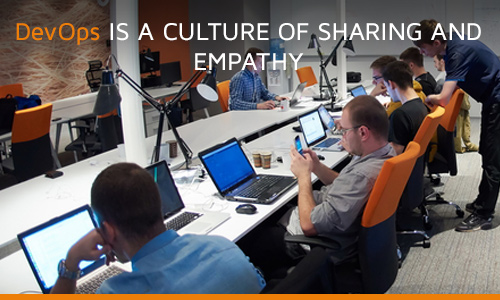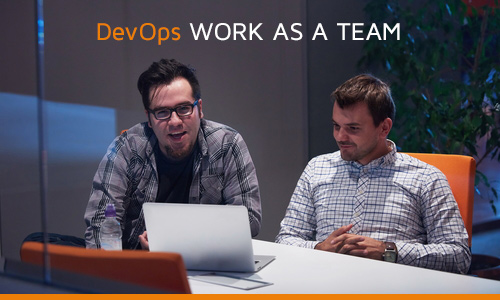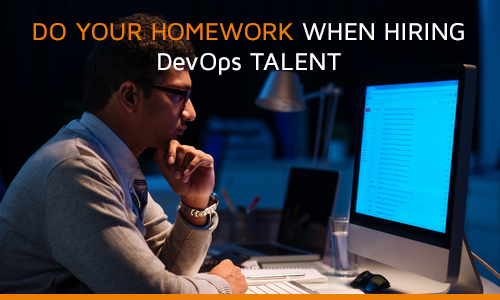Embracing the New Company Culture of DevOps
January 19, 2016“You can’t directly change culture. But you can change behavior, and behavior becomes culture.”
— Lloyd Taylor, VP of Infrastructure, ngmoco
The Culture of DevOps and Hiring Tips 
Matt Stratton, one of the new voices in the DevOps community, talked with Telehouse about the culture of DevOps and his approach to finding, hiring and retaining DevOps talent. Matt is a Senior Solutions Architect at Chef. He’s also one of the founders at ArrestedDevOps, a popular podcast devoted to all things DevOps.
Matt has gleaned his wisdom from years in the industry—not only as a DevOps himself, but also from hours of conversation with thought leaders in the DevOps community on his podcast.
Here is what he has to say:
“DevOps isn’t a job description – it’s a culture—and this culture is transforming enterprise. It’s a quest for continuous, agile delivery and it has sparked a revolution. At its heart, DevOps is one thing: get value to the customer—faster, smarter. Make solutions automated and accessible on demand.”
The title ‘DevOps’ can be misleading
Don’t fall in love with the name. Until recently, this same job was called Systems Administrator.
Instead, focus on finding someone with the right skills for your particular job. One way hiring teams save time is by defining what their new hire will do and including the details in the job description.
DevOps company culture is a culture of sharing and empathy

We have empathy. Sometimes we have empathy like: I don’t want my TechOps friend to get woken up on call in the middle of the night.
Sometimes empathy means “I understand systems.” As a developer I need to understand that a system must be scalable. I need to be empathetic and respond to the needs of my business.
Align incentives to business goals
The reality is, our job isn’t to write code, but to understand it. The business does not exist so that we can keep the servers up. The business is there to sell products.
That’s the incentive, to enable the business to sell products.
An important hiring tip to consider is no matter what we do: whether it is sales, accounting—whatever it is, if it’s not directly tied to that, the incentive is wrong. If you’re incentivizing the behavior you don’t want, then you can’t be surprised if you don’t get the results you’re expecting.
To find and retain DevOps, think like they think

- Be prepared to develop a team, not just an individual.
- DevOps talent can be called System Admin or Software Developer; it all depends on their title at their current company.
- Don’t just hire. Retrain the talented people you already have. Change the behavior, and you will change the company culture.
- Be intentional about who you’re trying to recruit. Know how their core competencies will meet the demands of your position.
- Align your incentives so teams are not working at cross-purposes.
Don’t expect to find a full-stack engineer
It’s a myth. People expect to find someone who knows the full stack. And not only do they need know the full stack, but they’re expert at it.
There’s like 12 of those people, and they all work for Netflix.
The title DevOps is broad. It’s something that scales. Streamlined, agile technology requires a mind of equal agility. You can do it with your existing team. You don’t necessarily need one person to do everything. That means you just need to be sure everyone understands most things.
Retain and Retrain
One of the most essential hiring tips is to hire at all different levels and retrain the people you already have. The worst thing a company can do is replace current staff with a whole new set of talent. It’s too expensive and counterproductive.
Do your homework on the person you’re reaching out to
Is he or she a developer only? Do they have dev operations experience? Do their core competencies fit with your position?
Find out if he or she:
- Needs to take a developers test;
- Holds white board sessions with team members;
- Are great at Chef / Go;
- Has a lot of things memorized or are able to navigate change;
- Are well versed in problem solving in a team environment;
- Can read code
“We expect everybody we hire to have some coding ability,” said Michael Fiedler of DataDog in an ArrestedDevOps podcast: Hiring in a Post DevOps World.
“They have to read code, and understand what it’s doing. That way they can find out where a problem may be, and then triage from there.”
“A lot of it is just figuring out how people think in a new situation. The way we execute things is, we take whatever knowledge we have at the moment, bootstrap from there and figure out the next thing. A lot of it is trial and error, scientific method, but a lot of it is just how you approach solving a problem.”
__________________________________________
If you’d like to learn more about the DevOps movement, Matt shared his book list. Incidentally, he shared this same list with his own team.


